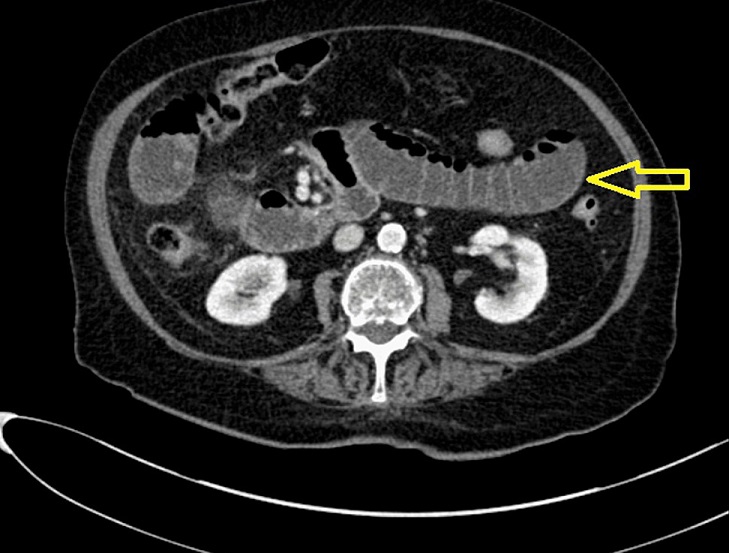Doctors Warn That COVID-19 Infections Can Lead To Abdominal Cocoon Syndrome That Causes Small Bowel Obstruction
Nikhil Prasad Fact checked by:Thailand Medical News Team Mar 09, 2024 1 year, 1 month, 1 week, 2 days, 4 hours, 32 minutes ago
COVID-19 News: Abdominal cocoon syndrome, also known as encapsulating peritoneal sclerosis, stands as a rare and mysterious medical condition characterized by the abnormal encapsulation of the small bowel within a thick membrane. With historical roots dating back to the 1860s, the syndrome presents a myriad of clinical manifestations, ranging from mild discomfort to life-threatening emergencies such as acute abdomen and intestinal obstruction. Despite its recognition, the etiology of abdominal cocoon syndrome remains elusive, prompting a continuous quest for understanding.
 That COVID-19 Infections Can Lead To Abdominal Cocoon Syndrome That Causes Small Bowel Obstruction
CT scan after gastrografin administration revealed a distended stomach with an air-fluid level inside.
That COVID-19 Infections Can Lead To Abdominal Cocoon Syndrome That Causes Small Bowel Obstruction
CT scan after gastrografin administration revealed a distended stomach with an air-fluid level inside.
Recent clinical observations have spurred renewed interest in this rare syndrome, particularly in its potential association with the coronavirus disease 2019 (COVID-19). As the pandemic unfolded, an increased incidence of abdominal cocoon cases emerged, creating a compelling narrative that connects recent severe COVID-19 infections to the development of this enigmatic syndrome. This
COVID-19 News report delves into a comprehensive case series by doctors from Mansoura International Hospital · Egypt involving six patients who presented with severe abdominal distension and persistent constipation following recent COVID-19 infections, shedding light on the potential interplay between these two medical phenomena.
Historical Context and Clinical Presentation
The historical narrative of abdominal cocoon syndrome dates back to 1868 when it was documented of the presence of an additional peritoneal membrane enveloping the small intestine, coining the term "peritoneal encapsulation." This membrane, resembling the peritoneum in structure, became the hallmark of abdominal cocoon syndrome. Alternative hypotheses propose links to well-known conditions like Ormond disease, suggesting a spectrum of fibrosclerotic alterations leading to the entrapment of structures.
Clinically, the syndrome predominantly presents as intestinal obstruction, with signs including abdominal distension, discomfort or pain, constipation, nausea, and vomiting. The term "abdominal cocoon syndrome" broadly refers to primary sclerosing encapsulating peritonitis, categorized into three subtypes based on the extent of small intestine encapsulation.
COVID-19 and Abdominal Cocoon Syndrome: Unraveling the Connection
The emergence of an abnormal membrane in the small intestine among COVID-19 survivors in the presented case series raises intriguing questions about the potential link between recent severe COVID-19 infections and abdominal cocoon syndrome. The study's findings showcase a small yet significant cohort of patients who, following their battles with COVID-19, underwent urgent
exploratory laparotomy due to acute intestinal obstruction. The common thread binding these cases was the presence of an abnormal membrane in the small intestine.
The connection between COVID-19 and abdominal cocoon syndrome prompts speculation about the underlying pathophysiological mechanisms. The virus's impact on the inflammatory response and vascular system may play a role in the formation of a fibrous membrane, akin to the known pro-fibrotic effects observed in COVID-19-related pulmonary fibrosis. While these speculations provide a framework, rigorous histopathological studies are imperative to validate the proposed mechanisms.
Diagnostic Challenges and Therapeutic Approaches
Diagnosing abdominal cocoon syndrome remains challenging, with preoperative confirmation often achieved through exploratory laparotomy. Radiological tools, particularly computed tomography (CT) scans with double contrast, aid in preoperative assessment by revealing pathological changes associated with the syndrome. However, the ultimate diagnosis is frequently made intraoperatively, underscoring the importance of surgical exploration in cases where definitive radiological imaging is lacking.
Therapeutic interventions for abdominal cocoon syndrome span a spectrum, with milder cases managed conservatively through measures such as gastrointestinal rest and total parenteral nutrition. In contrast, recurrent and complex cases necessitate surgical interventions, primarily laparotomy or laparoscopy if feasible. The removal of the encapsulating membrane constitutes the cornerstone of treatment, relieving the obstruction and restoring normal bowel function.
Clinical Profiles and Implications
The presented retrospective cross-sectional study offers insights into the clinical profiles of six patients who underwent exploratory laparotomy for acute intestinal obstruction following COVID-19 infections. The study highlights the importance of considering COVID-19 as a multi-systemic disease with potential long-term consequences, emphasizing the need for heightened clinical vigilance.
Patient outcomes in the study were generally positive, with successful removal of the abnormal membrane and resolution of symptoms. The study's implications extend beyond the specific cases investigated, emphasizing the significance of recognizing COVID-19 as a potential contributing factor in various health issues, including those affecting the digestive system.
Conclusion
In conclusion, abdominal cocoon syndrome remains an enigmatic medical condition with an uncertain etiology. The presented case series intriguingly suggests a potential link between recent severe COVID-19 infection and the development of this rare syndrome. While diagnostic challenges persist, with intraoperative confirmation often necessary, the study underscores the importance of considering COVID-19 in cases of abdominal cocoon syndrome, especially when evaluating patients with chronic abdominal pain and bowel obstruction.
The collaborative effort across medical centers becomes imperative in unraveling the complexities of this potential association. The fusion of clinical insights, research endeavors, and interdisciplinary collaboration holds promise in shedding light on the intricate mechanisms underpinning abdominal cocoon syndrome. Continued research and clinical collaboration are essential to enhance our comprehension of this rare condition and improve patient care in the ever-evolving landscape of medical knowledge.
The case series was published in the peer reviewed journal: Cureus.
https://www.cureus.com/articles/174270-small-bowel-obstruction-due-to-abdominal-cocoon-syndrome-in-post-covid-19-patients#!/
For the latest
COVID-19 News, keep on logging to Thailand Medical News.
